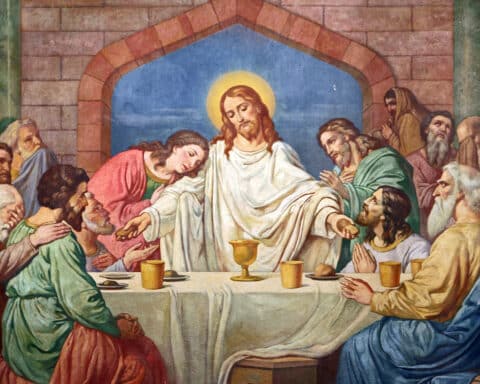His answer was quite strange. Some Greeks wanted to see Jesus. Foreigners were there for the feast, perhaps they just wanted to meet the famous preacher. They go to Philip; Philip goes to Andrew; Philip and Andrew go to Jesus. It’s an apostolic entourage of a sort. But we’re never even told whether those nameless Greeks got to meet Jesus. I hope they did, but the text isn’t clear.
His answer might not have made any sense anyway, especially if he told the Greeks what he said to Philip and Andrew: “The hour has come for the Son of Man to be glorified. Amen, amen, I say to you, unless a grain of wheat falls to the ground and dies, it remains just a grain of wheat; but if it dies, it produces much fruit. Whoever loves his life loses it, and whoever hates his life in this world will preserve it for eternal life” (Jn 12:23-25). What’s that? These Greeks simply want to see Jesus. What does he mean by all this talk of a grain of wheat dying, hating life and preserving it and all that? Strange answer. What is Jesus about?
We should remember at this point that we are reading John’s Gospel. We ought to know by now that, with John, we should always be open to going deeper, that we should always look under the surface of the story for the mystical and spiritual. Doing so opens us to the contemporary mystery of Christ and the mystery present on the altar near where you hear these words proclaimed.
Jesus wants to see the Greeks
Remember the prologue, these words: “But to those who did accept him he gave power to become children of God, to those who believe in his name, who were born not by natural generation nor by human choice nor by man’s decision but of God” (Jn 1:12-13). Israel is to be opened even to gentiles simply by faith. Jesus opens the door himself; note the “second sign,” how he healed the royal official’s son, a gentile (cf. Jn 4:46-54). Note also what Jesus says in the strange answer he gave Philip and Andrew: “[When] I am lifted up from the earth, I will draw everyone to myself” (Jn 12:32). Yes, the Greeks want to see Jesus, but he really wants to see them.
| March 17 – Fifth Sunday of Lent |
|---|
|
Jer 31:31-34 Ps 51:3-4, 12-13, 14-15 Heb 5:7-9 Jn 12:20-23 |
But how? Remembering that Jesus’ mission includes the Greeks (and you and me, by the way) it’s a bit easier to understand why Jesus would have talked about death and grains of wheat that must first die and then bear fruit. Maybe Jesus is talking about his death and the Eucharist. Some Greeks want to see Jesus, and Jesus talks immediately about seed (the seed is the “word,” cf. Mk 4:14) that “dies” only to bear “much fruit.” These tangled metaphors bear a mystery. Jesus is telling us how those Greeks (and you and me, for that matter) will see Jesus: in the fruit of the seed that has died and born fruit, that is, in the Eucharistic flesh of the risen Word of God. That’s how we “recognize” him — in the breaking of the bread (cf. Lk 24:31).
All of a sudden, Jesus’ answer isn’t so strange. All of a sudden, Jesus’ answer makes us look over at the altar, anticipating the priest’s invitation to “behold” the Lamb of God, to see Jesus.
It’s beautiful what the Scripture does, isn’t it? How it reveals to us what’s right in front of us.
So, go ahead: ask to see Jesus. Go wherever the apostles are, find the apostolic Church. But then interpret the strange answer and look for that fruit of the seed that is the Word, look for Jesus. Because that’s where he is, and he wants to see you too.





